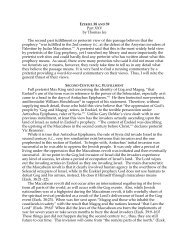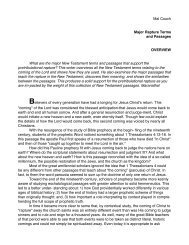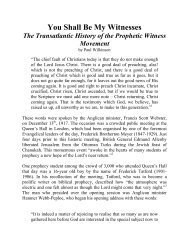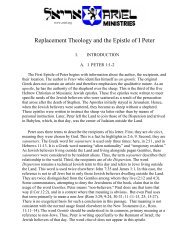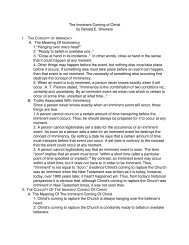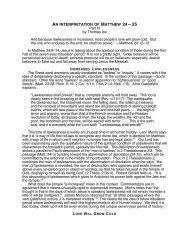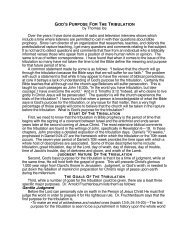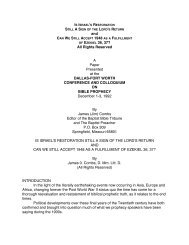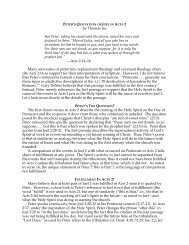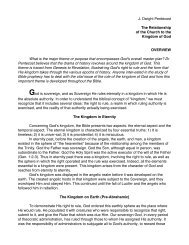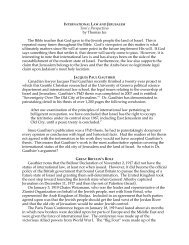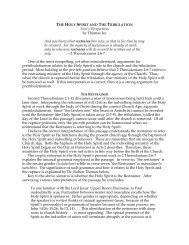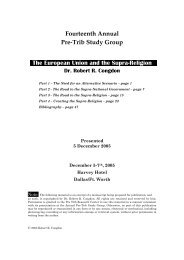PDF version - Pre-Trib Research Center
PDF version - Pre-Trib Research Center
PDF version - Pre-Trib Research Center
Create successful ePaper yourself
Turn your PDF publications into a flip-book with our unique Google optimized e-Paper software.
Christian Zionism History — Ice — Page 18<br />
Even though widely known throughout evangelicalism for a number of things, he<br />
is best known for his tireless work on behalf of reestablishing the Jewish nation in Israel.<br />
Timothy Weber says of Blackstone and dispensationalism the following:<br />
Most dispensationalists were satisfied to be mere observers of the Zionist<br />
movement. They watched and analyzed it. They spoke out in favor of it. But<br />
seldom did they become politically involved to promote its goals. There is<br />
one exception to the general pattern, however, in the person of William E.<br />
Blackstone, one of the most popular dispensational writers of his time. 162<br />
By 1891, Blackstone the activist had obtained the signatures of 413 prominent<br />
Americans and sent this document to <strong>Pre</strong>sident Benjamin Harrison advocating the<br />
resettlement of persecuted Jews in Russia to a new homeland in what was then called<br />
Palestine. 163 Part of the petition read as follows:<br />
Why not give Palestine back to them again? According to God’s<br />
distribution of nation it is their home—an inalienable possession from which<br />
they were expelled by force. Under their cultivation it was a remarkably<br />
fruitful land, sustaining millions of Israelites, who industriously tilled its<br />
hillsides and valleys. They were agriculturists and producers as well as a<br />
nation of great commercial importance—the center of civilization and<br />
religion. . . .<br />
We believe this is an appropriate time for all nations, and especially the<br />
Christian nations of Europe, to show kindness to Israel. A million of exiles,<br />
by their terrible suffering are piteously appealing to our sympathy, justice,<br />
and humanity. Let us now restore to them the land of which they were so<br />
cruelly despoiled by our Roman ancestors. 164<br />
Ehle had the following to say about the signers:<br />
Among the 413 signers listed by their cities—Chicago, Boston, New York,<br />
Philadelphia, Baltimore, and Washington—were the opinion makers of the<br />
day: the editors and/or publishers of the leading newspapers and religious<br />
periodicals (at least ninety-three newspapers in all), the mayors of Chicago,<br />
Boston, New York, Philadelphia, and Baltimore, as well as other officials,<br />
leading churchmen and rabbis, outstanding businessmen, and in Washington,<br />
Speaker of the House of Representatives, T. B. Reed, Chairman of the House<br />
Committee on Foreign Affairs, Robert R. Hitt, and William McKinley, of<br />
Ohio, who later became president. 165<br />
Even though it accomplished little politically, Blackstone’s petition was said to have<br />
had a galvanizing impact upon Americans as a whole. The petition received<br />
widespread coverage in newspapers and generated a great amount of discussion and<br />
acceptance. It sparked great interest among the Jews as a whole. 166<br />
Blackstone later made a similar appeal to <strong>Pre</strong>sident Woodrow Wilson, a<br />
<strong>Pre</strong>sbyterian minister’s son who became a Christian Zionist, which influenced his<br />
acceptance of the Balfour Declaration of 1917. 167 It is not surprising that there is today a<br />
forest in Israel named the “Blackstone Forest” in his honor. Neither should it be<br />
surprising to learn that “William E. Blackstone, once dubbed the ‘father of Zionism’ for



